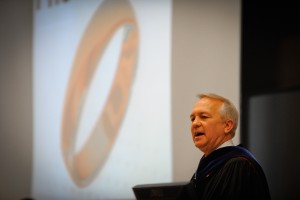| Curriculum and Advising |
- B.S. in Materials Science and Engineering
Materials engineers at NC State are trained to understand the wide range of phenomena that occur in all classes of materials: metals, polymers, composites, ceramics, and electronic materials. Two laboratory courses introduce students to analytical methods used to characterize materials’ structures and properties. Cutting-edge concepts (e.g. nanotechnology and biomaterials) are dispersed throughout junior and senior level courses, and 5 engineering and technical electives give students flexibility to customize their education with regard to interests and career goals. Finally, the two-semester senior design sequence provides a bridge between learning and practical application as teams of students work on real-world materials problems submitted by local industry partners.
|
| Concentration Options |
- BS in Materials Science and Engineering – Biomaterials Concentration
The Biomaterials Concentration in the MSE department will provide undergraduate students with a comprehensive materials science and engineering background, while introducing elements of biology that will afford students an understanding of how materials interact with the body and how they can enhance quality of life. Students who graduate with a biomaterials concentration in MSE will be well suited for a career in medical device and medical technology industries that require sufficient understanding of materials selection, processing, and characterization.
- BS in Materials Science and Engineering – Nanomaterials Concentration
The Nanomaterials Concentration in MSE will provide undergraduate students with a comprehensive materials science and engineering background, while emphasizing concepts for understanding materials at length scales approaching the size of a few individual atoms or molecules of a material in the form of ultra-thin films, nanowires and nanoparticles. Properties from materials at these scales can differ from those observed in bulk specimens, while material structure engineering at the nanoscale can influence bulk structural and functional properties. Students who graduate with a Nanomaterials Concentration in MSE will be well prepared for a career working with materials that support nanotechnology industries including electronics, structural materials, and pharmaceuticals.
|
| Credit Hours to Graduate |
126 |
| MSE Minor |
- Minor in Materials Science and Engineering
The Materials Science and Engineering minor is designed to provide undergraduate engineering and science majors, in curricula other than MSE, with the fundamentals of modern materials science and engineering. Completion of the MSE minor requires a minimum of 15 credit hours, which includes 9 credits of required courses and at least 6 credits of elective courses.
|
| Program Educational Objectives (PEO) |
With the background knowledge in science, engineering, critical thinking and teamwork provided by the MSE curriculum, our alumni are expected to achieve one or more of the following within five years of graduation:
- Practice materials engineering in appropriate academic, industrial, government or entrepreneurial organizations.
- Earn an advanced degree such as MS, PhD or MBA, leading to a career in academia, research and development, or technical management.
- Be promoted into leadership roles in their chosen career.
- Demonstrate by their participation in technical societies, community service and professional activities a high degree of service and ethical responsibility to their professional field and the community.
|
| Jobs and Salary |
Materials Engineers Occupational Outlook and Salary, Bureau of Labor Statistics |
